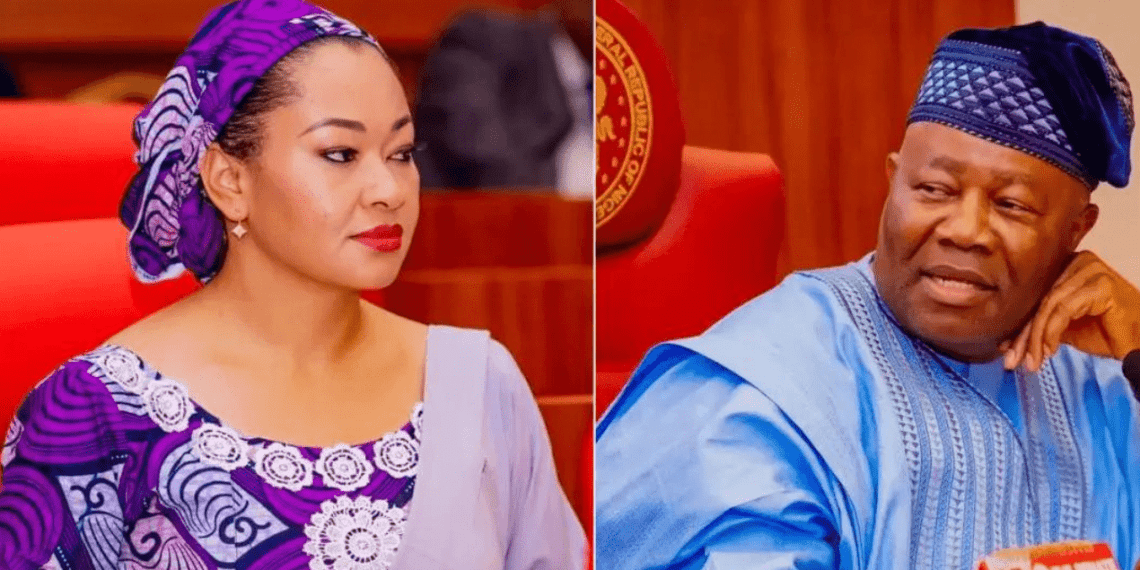The Nigerian Senate erupted into chaos on Thursday as Senator Natasha Akpoti-Uduaghan, representing Kogi Central, was at the center of a heated confrontation that saw Senate President Godswill Akpabio order her out of the chamber. The dramatic incident, which unfolded during a plenary session, has sparked widespread reactions, raising concerns over parliamentary decorum, gender dynamics, and legislative power play.
The dispute reportedly began when Senator Mohammed Ali Monguno, the Chief Whip, raised a point of order regarding what he described as an “improper seating arrangement” concerning Senator Akpoti-Uduaghan. Tensions escalated rapidly as the Kogi Central senator engaged in a heated exchange with Senate officials over an alleged unilateral change of her seating position without prior consent. As the back-and-forth intensified, the Sergeant-at-Arms surrounded her, seemingly preparing to escort her out of the chamber, further fueling the disorder.
Senate President Akpabio, presiding over the session, intervened and reportedly ordered her to leave the chamber, a move that has since been widely debated. The altercation disrupted legislative proceedings for several minutes before Senate officials took steps to restore order, including shutting down the public address system to silence the heated exchange.
This confrontation is the latest in a series of clashes between Akpabio and Akpoti-Uduaghan. In July 2024, the Senate President famously rebuked her during a plenary session, stating, “We are not in a nightclub,” after she spoke out of turn. The comment drew sharp criticism, with many accusing him of sexism. He later issued a public apology, but the latest order for her removal has reignited concerns over his leadership style and interactions with female senators.
Senator Akpoti-Uduaghan, a member of the Peoples Democratic Party (PDP), assumed office in November 2023 following a protracted legal battle affirming her victory in the February 2023 Kogi Central Senatorial Election. She has since been an outspoken lawmaker, chairing the Senate Committee on Local Content and advocating for key issues, including the revitalization of the Ajaokuta Steel Plant. Her assertiveness has frequently put her at odds with the Senate leadership, particularly Akpabio, who has presided over the 10th Senate since June 2023.
Akpabio, a former governor of Akwa Ibom State and a key figure in the ruling All Progressives Congress (APC), has faced mounting criticism for remarks and actions perceived as dismissive of female legislators. Women’s advocacy groups, including Voices for Inclusion and Equity for Women (VIEW), have condemned what they describe as a pattern of disregard for female senators. The latest confrontation has further fueled concerns about gender bias in Nigeria’s legislative environment.
Read also: Akpabio, Ekpo, APC chieftains receive awards at inauguration of MOP in A/Ibom
The Standing Orders of the Nigerian Senate grant the Senate President significant authority to maintain order. However, while the presiding officer can name a senator for disorderly conduct and initiate suspension proceedings through a formal motion, there is no explicit rule allowing a unilateral ejection from the chamber. Akpabio’s directive for Natasha’s removal without such a process has raised questions over procedural overreach.
Reactions to the incident have been divided. Supporters of Akpabio argue that maintaining decorum is paramount to the Senate’s functionality and that Natasha’s actions warranted a firm response. Critics, however, view it as an abuse of power, reinforcing concerns over Akpabio’s leadership style. The controversy has ignited social media debates, particularly on X (formerly Twitter), where many are questioning whether a male senator would have faced similar treatment.
As tensions simmer, the fallout from this dramatic exchange is expected to shape future interactions in Nigeria’s upper legislative chamber. Whether it signals a deeper rift in the Senate or merely a temporary clash remains to be seen.






